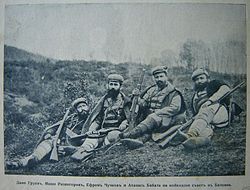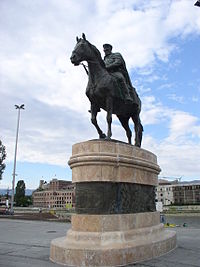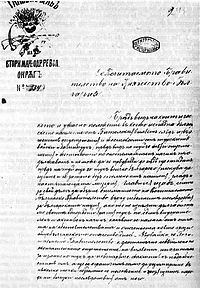- Dame Gruev
-
 Dame Gruev
Dame Gruev
Damyan Yovanov Gruev or Damjan Jovanov Gruev, often known by his short name Dame Gruev,[1] (January 19, 1871, Smilevo, present-day Republic of Macedonia - December 10, 1906 near Petlec peak in Maleshevo, present-day Republic of Macedonia) was an insurgent leader in Ottoman Macedonia and Thrace. He was among the founders of the Bulgarian Macedonian-Adrianople Revolutionary Committees.[2] The mainstream scholarship regards him as a Bulgarian [3][4][5][6][7][8][9][10][11][12] and the Macedonian scholars as Macedonian revolutionary.[13][14][15][16]
Contents
Biography
Early years
Dame Gruev was born in 1871 in the village of Smilevo, Ottoman Macedonia (present-day district of Bitola, Demir Hisar Municipality, Republic of Macedonia). He received his elementary education in Smilevo and continued his education in the Bulgarian Men's High School of Thessaloniki. After a student revolt Gruev, with a group of his comrades, were excluded from the school. In the early 1888, the group, consisting of 19 people, including other future IMRO-revolutionaries was attracted by the Serbian propaganda. As result they went to study in a Serbian Gymnazium in Belgrade at expense of the St. Sava Association. Later Gruev continued his education in the Great School in Belgrade. There he, and his comrades were put under a strong pressure to serbianize them and they rebelled again. As a consequence, all they were excluded from the Great School and emigrated am block to Bulgaria. Here Gruev began to study history at the Sofia University and afterwards enrolled in the Young Macedonian Literary Society. He found also the circle "Druzhba", whose aim was to implement "Article 23" from the Treaty of Berlin (1878) on authonomy of Macedonia. In 1891 Gruev was expelled from the University as he was suspected in the assassination of the Minister Hristo Belchev, but subsequently this allegations turned groundless.
Next, Gruev left the University and returned to Ottoman Macedonia region to apply himself to a new revolutionary organization. In order to carry out his plans more successfully, and possibly to avert the suspicion of the Turkish authorities, he decided to become a Bulgarian school teacher. The first two years after his return to Macedonia region he spent teaching, first in his native village of Smilevo, and later in the town of Prilep. Later, Gruev established himself in Thessaloniki and here laid the foundation of BMARC (the Bulgarian Macedonian-Adrianople Revolutionary Committees). With the cooperation of Hristo Tatarchev and Petar Pop Arsov among others, he came up with the Constitution and By-laws of IMARC. It was to be a secret organization under the guidance of a Central Committee, with local revolutionary committees throughout Macedonia and the region of Adrianople (Edirne). These regions were to be divided into revolutionary districts or rayons like in the April Uprising. In accordance with the Constitution, the first Central Revolutionary Committee was formed in the summer of 1894, under the chairmanship of Hristo Tatarchev.
1894 to 1900
The 1894 - 1900 period was a really active one for the revolutionary Gruev. In the summer of 1894 in Negotino, he organized the first local revolutionary committee, and soon after with the cooperation of Pere Toshev, the first district committee in the city of Štip. Gruev visited the cities of Resen, Ohrid, and Struga as well, and found the local population to be accepting his organization's revolutionary ideas very well. He remained a teacher in Štip during the academic year 1894-1895. In the fall of 1895 Gotse Delchev arrived in Štip with the idea of laying the foundations of a revolutionary movement seeking autonomy for Macedonia and Adrianople Thrace. Gruev and Delchev met for the first time and shared their ideas there. Gruev introduced Delchev to the plan already outlined by the Central Committee of Thessaloniki. After this, both Gruev and Gotse Delchev worked together in Štip and its environs.
The expansion of the IMRO at the time was phenomenal, particularly after Gruev settled in Thessaloniki during the years 1895-1897, in the quality of a Bulgarian school inspector. Gruev had become the soul and body of the Central revolutionary committee. Under his direction, secret revolutionary papers were issued, ciphers were introduced, pseudonyms or a nom de plume were used, and channels for secret communication between various other local and Macedonian committees were maintained. A representative of the Central Revolutionary Committee was to sent in Sofia to take charge of purchasing and dispatching of the necessary war provisions for IMARC. Gruev’s tirelessly travelled throughout Macedonia and the Vilayet of Adrianople and systematically established and organized committees in villages and cities. Unfortunately, for purely political reasons, and in order to avoid suspicion from the Ottoman authorities, IMARC decided to dismiss Gruev in 1898. Soon after his dismissal Gruev moved to Bitola and there with the cooperation of Petar Poparsov, Vasil Paskov and others, he began to issue a revolutionary paper.
He organized a system in which money was collected from Sunday schools through a special "revolutionary tax", and a quantity of war materials was purchased. Gruev was again appointed to the teaching staff now in the city of Bitola, and as such, he also assumed the management of the revolutionary movement in the Vilayet of Monastir (Bitola), while the active persons at the Committee in Thessaloniki were Hristo Tatarchev, Pere Toshev, and Hristo Matov. Gruev’s activities in the Bitola district were not left unnoticed by the Ottoman authorities. Numerous chetas (bands) throughout the surrounding mountains began to terrorize the local authorities. Gruev, being suspected as a major factor in fostering this movement, was arrested on 6 August 1900. He was held in Bitola jail until May 1902. However, by using secret writings and ciphers, he was able to remain in contact with the local revolutionary committees, and direct the affairs of the revolutionary district of Bitola.
Uprising
- See also: Ilinden-Preobrazhenie Uprising
In the latter part of May, 1902, Gruev was condemned to banishment in the prison of Podrum Kale in Anatolia. There he found Hristo Matov and Hristo Tatarchev, both sentenced to exile in January 1901. Gruev and his comrades were kept in Podroum Kale for ten months. Although he was away from Macedonia and Thrace itself, Gruev managed to keep himself informed as to the development and affairs of the IMARO. He kept up a steady stream of encrypted correspondence with Thessaloniki, Bitola, and Sofia. On Easter of 1903, at the instance of a general amnesty, he was released. Gruev hastened to Thessaloniki and there he found that the Central Committee, which was in charge of the IMARO, had already resolved to declare a general insurrection which was to take place during 1903. Although Gruev was not in accord with the Central Committee’s decision, primarily because of the SMARO’s lack of preparedness, he gave in to the decision of the central Committee.
He left Thessaloniki and went to Smilevo where the insurrectionary Congress was to be held. The purpose of this Congress was to set the date for the declaration of the general insurrection and to outline the methods and tactics in its prosecution. Here Gruev met Boris Sarafov, who had just arrived from Bulgaria. Gruev was elected as chairman of this Congress, and the latter decided that the day of the declaration of the insurrection was to be 2 August 1903. Gruev, Boris Sarafov, and Aleksandar Lozanchev were elected by the Congress as the three members of the General Staff, and empowered to direct the insurrectionary forces in the Bitola region. Gruev lived to see the retreat of the Turkish troops from his native village of Smilevo. He was engaged, during the course of the insurrection, in numerous skirmishes with the Ottoman army. But with the arrival of Ottoman troops, any progress of the insurrection was made impossible and in a period of six weeks it was completely crushed. Gruev put himself to task of touring various revolutionary districts, disarming the insurgents, and storing up the war materials for future use. Gruev and his followers continued the work of organization and preparation for another uprising.
After the Uprising
In 1904 Dame Gruev chaired the Prilep Congress of the Bitola Revolutionary District of IMRO. In the autumn of that year, Dame was captured from the Serboman's leader Micko Krstević, but was set free, with the assistance of Gligor Sokolović, after his negotiations with Pere Toshev. In 1905 Gruev headed the first General Congress of the organization after the uprising, the so called Rila Congress. Here Dame Gruev was elected as a member of the Central Committee and became in fact its leader, until his death. Indeed Dame was the only one, who appeared was capable mastering the leader-ambitions of Yane Sandanski. However, the Rila Congress failed to erase the political differences in the organization. There arose a need to conduct a new special congress in Sofia in December 1906, which never took place. At the end of 1906, Gruev moved with his detachment from Ottoman Macedonia to Sofia to attend at the special Congress. On December 23, 1906 Dame Gruev, and his detachment were discovered by the Turkish authorities near the village of Rusinovo (Maleševo district). So Gruev and his band were confronted by Ottoman forces and in the following battle he was killed.
Gruev Cove in Greenwich Island, South Shetland Islands, Antarctica is named for Dame Gruev.
Notes
- ^ The first names are transliterated either as Damjan Jovanov, after the Bulgarian Дамян Йованов Груев and Macedonian Дамјан Јованов Груев. The last name is also sometimes rendered as Grueff.
- ^ ..."It appears to have originally been called the Bulgarian Macedonian-Adrianopolitan Committee (BMORK — the'O'standing for Odrin or Adrianopole). In 1902 it changed its name to the Secret Macedonian Adrianopolitan Revolutionary Organisation"... Who are the Macedonians? Hugh Poulton, C. Hurst & Co. Publishers, 2000, ISBN 1850655340, p. 53.
- ^ "The National Question in Yugoslavia. Origins, History, Politics" by Ivo Banac, Cornell University Press, 1984. pp. 307-328
- ^ Д. О. Лабаури. Болгарское национальное движение в Македонии и Фракии в 1894 - 1908 гг.: Идеология, программа, практика политической борьбы. София, 2008. с. 248.
- ^ Российская Академия Наук, Институт Славяноведения, Человек на Балканах, Государство и его институты: гримас политической модернизации, последняя четверть XIX — начало XX в. с. 166-176.
- ^ Region, Regional Identity and Regionalism in Southeastern Europe, Klaus Roth, Ulf Brunnbauer, LIT Verlag Münster, 2009, ISBN 3825813878, pp. 135-136.
- ^ We, the people: politics of national peculiarity in Southeastern Europe, Diana Mishkova, Central European University Press, 2009, ISBN 9639776289, p. 125.
- ^ Claiming Macedonia: the struggle for the heritage, territory and name of the historic Hellenic land, 1862-2004, George Constantine Papavizas, McFarland & Company, 2006, ISBN 0786423234, p. 41.
- ^ Socialism and nationalism in the Ottoman Empire, 1876-1923, Mete Tunçay, Erik Jan Zürcher, British Academic Press and International Institute of Social History, Amsterdam, 1994 ISBN 1850437874, p. 33.
- ^ Contested Ethnic Identity: The Case of Macedonian Immigrants in Toronto, 1900-1996, Nationalisms Across the Globe, Chris Kostov, Peter Lang, 2010, ISBN 3034301960, pp. 69-70.
- ^ Yugoslav Communism and the Macedonian Question, Stephen E. Palmer, Robert R. King, Archon Books, 1971, ISBN 0208008217, p. 14; p. 117.
- ^ Сборник: Вътрешната Македоно-Одринска революционна организация през погледа на нейните основатели. Спомени. Съставителство, предговор и бележки П е т р о в, Т. и Ц. Б и л я р с к и, 1995, стр. 13-48.
- ^ Ivo Banac, With Stalin against Tito: Cominformist splits in Yugoslav Communism
- ^ Dame Gruev's death on macedonium.org
- ^ "They took for their motto the words of Gladstone "Macedonia for the Macedonians". They differentiated themselves from the Bulgarians and the Macedonians living in Bulgaria....", Macedonia's heroic struggle for freedom, New York Times, 6 December 1903
- ^ Dame Gruev's memories:."..And them I with few others Macedonians went to Belgrade." in Macedonian
See also
- IMRO
- History of the Republic of Macedonia
- History of Bulgaria (1878–1946)
- Gotse Delchev
- Battle of Smilevo
Andon Dimitrov · Damyan Gruev · Ivan Hadzhinikolov · Petar Poparsov · Hristo Batandzhiev · Hristo Tatarchev Categories:
Categories:- 1871 births
- 1906 deaths
- People from Demir Hisar
- Members of the Internal Macedonian Revolutionary Organization
- Macedonian revolutionaries (ethnic group)
Wikimedia Foundation. 2010.



